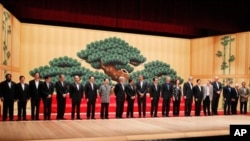Trade talks took a backseat to diplomatic tensions on the first day of the Asia Pacific Economic Cooperation leaders summit. Japanese Prime Minister Naoto Kan met with leaders from China and Russia to discuss territorial disputes that have strained relations.
Japanese Prime Minister Naoto Kan and Chinese President Hu Jintao officially met at the APEC summit for the first time since a boating crash off disputed islands ignited a fierce debate between the 2 countries.
China disputes Japan's claims to the islands, but in bilateral talks Saturday neither side reached an agreement. The Japanese Foreign Ministry says the two sides stated their historic positions, then agreed to cooperate on economic issues and maintaining stability in the region.
The meeting between Japan and China came on the same day Mr. Kan met with Russian President Dmitry Medvedev to try and smooth over similar tensions involving disputed territory.
The diplomatic talks overshadowed free trade discussions - the larger goal of the APEC leaders summit. The United States is leading the push to create a Trans Pacific Partnership that would lift import tariffs in 9 countries including Japan.
President Barack Obama says the TPP is the first step to creating a trade pact that involves all APEC countries. And in his address to regional business leaders, Mr. Obama stressed the U.S. goal to double exports in the next 5 years.
"For America, this is a jobs strategy," he said. "With every $1 billion we sell in exports, 5,000 jobs are supported at home. And jobs supported by exports pay up to 18% higher than the national average."
Prime Minister Kan expressed support to begin discussions on the TPP, saying Japan was ready to open its doors in a significant way. The host country has been reluctant to endorse the proposed agreement because of opposition from domestic farmers who say any trade deal would drive down their prices.
He said Japan has been slow to open its doors to trade - but he said our country cannot prosper without working with the world, especially Asian countries.
The Chinese President also vowed to work with the international community. President Hu Jintao has faced increasing pressure to reduce China's trade surplus and revalue its yuan currency.
President Hu said that emerging markets remained "fragile" and that developed countries should not ask them to take on obligations beyond their capabilities.
"The international community should encourage emerging markets in the Asia-Pacific to assume international responsibilities on the basis of their capabilities, national circumstances, and stage and level of development," he said.
The APEC leaders are expected to agree on a declaration that describes how to move forward with its trade goals, before the summit wraps up Sunday.
Diplomatic Talks Overshadow Trade Discussions at APEC Summit




